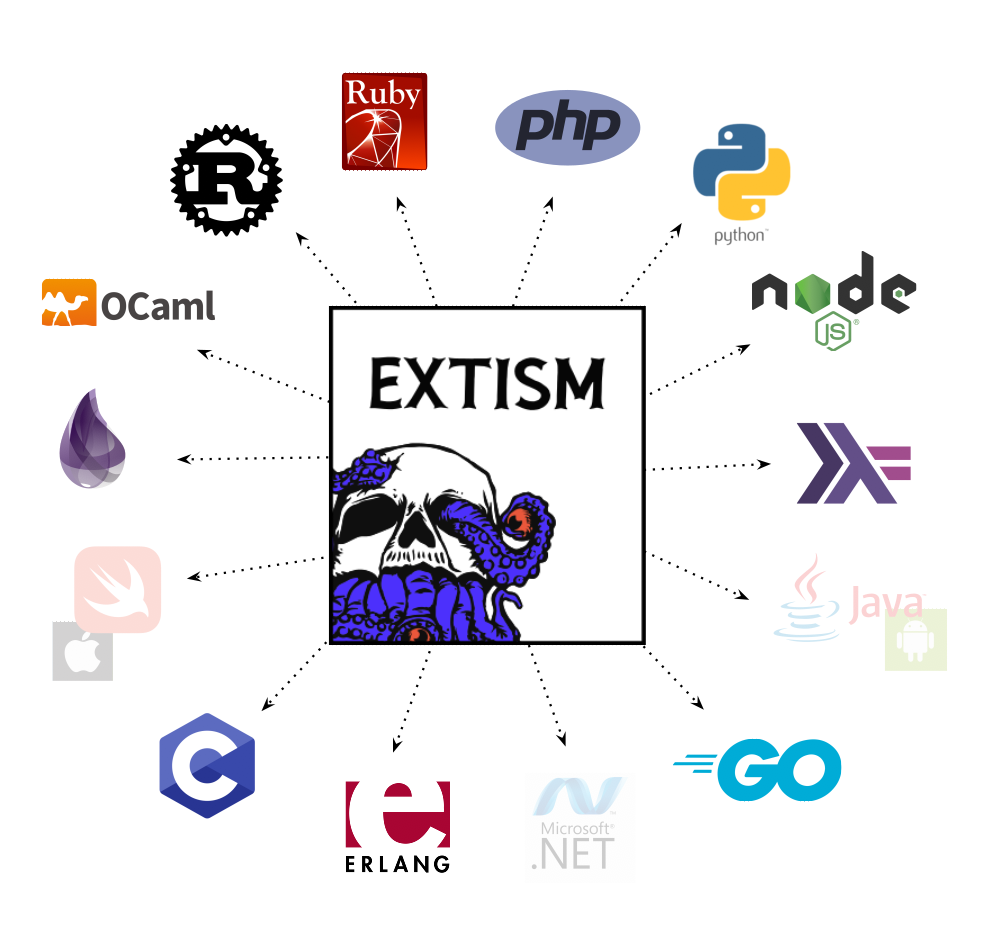Overview
Extism is a plug-in system for everyone. We've carefully designed it to be flexible, fitting into codebases of all shapes and sizes, but opinionated enough so that things Just Work™ the way they should. Extism's goal is to make all software programmable.

You can use Extism in your codebase, regardless of the programming language. We support several environments through our official Host SDKs, and are adding more language support all the time. Let us know if we're missing yours by opening an issue on GitHub, or talk to us in our Discord server.
Why use a plug-in system?
A plug-in system is software that enables your users or customers to add some logic into certain points in your application. You decide where this logic runs, and your users decide what the plug-in does.
Many engineering teams face an ever-growing list of feature requests, often exceeding their bandwidth several times over. How can you ever keep up? Making your product extensible by its end-users is a great way to move some of those features outside the core, and empower customers to make your software more useful for them.
Practically speaking, you can't predict all the ways users will want to work with your software, and for that reason alone a plug-in system is an ideal feature to implement.
Common use cases
- adding functionality to command-line tools
- enabling users to "mod" a game
- simplify "webhooks" to run event-driven logic in vendor system
- user-defined functions in a database
- no-code application extensions
- content management system extensions
When using Extism, your job is to determine where in your application some arbitrary code should run, what data that code should be provided, and the data the plug-in should return.
With Extism, you would locate a spot in your codebase, before some event or function such as charge_credit_card(), and run a function from a plug-in that is dynamically loaded and possibly from a third party. Extism is built on top of WebAssembly, which makes untrusted code execution like this safe to do via isolation and sandboxing!
Example in action
Here's some partial code demonstrating an example ecommerce platform allowing store owners to add custom discount logic:
require 'extism'
require 'json'
ctx = Extism::Context.new
# your manifest can be created from wasm code on disk (seen here), or from bytes read from other
# sources such as a database or cache.
manifest = {
:wasm => [{:path => "store_owner/checkout.wasm"}]
}
plugin = ctx.plugin(manifest)
input = JSON.generate({
:cart_total => cart_total.as_cents,
:is_new_customer => true,
:provided_email => false
})
# call the plug-in's `before_checkout_finalize` function for any custom behavior
output = JSON.parse(plugin.call("before_checkout_finalize", input)
# output = {discount_percent: 20.0}
# use the output however you want in order to charge the customer accordingly
if output.discount_percent > 0
charge_credit_card(cart_total.apply_discount(order.discount_percent))
else
charge_credit_card(cart_total)
end
A store owner can implement a plug-in in a variety of languages (the only real requirement is that it can be run in or as WebAssembly). We officially support many options through the use of an Extism Plug-in Development Kit (PDK). Here's an example of the before_checkout_finalize function implemented in a plug-in:
use extism_pdk::*;
use serde::{Deserialize, Serialize};
#[derive(Deserialize)]
struct CartDataInput {
pub cart_total: i32,
pub is_new_customer: bool,
pub provided_email: bool,
}
#[derive(Serialize)]
struct CartDataOutput {
pub discount_percent: f32,
}
#[plugin_fn]
pub fn before_checkout_finalize(Json(checkout_data): Json<CartDataInput>) -> FnResult<Json<CartDataOutput>> {
let mut output = CartDataOutput {
discount_percent: 0.0,
};
// store owner decides what to do here
if checkout_data.is_new_customer && checkout_data.cart_total >= 10000 {
// new customer & $100+ spend, give a 20% discount
output.discount_percent = 20.0
}
Ok(Json(output))
}
Usage
Add a fast, flexible, and secure plug-in system to your project. Server, desktop, mobile, web, database -- you name it. Enable users to write and execute safe extensions to your software in 3 easy steps:
1. Import
Import an Extism Host SDK into your code as a library dependency.
2. Integrate
Identify the place(s) in your code where some arbitrary logic should run (the plug-in!), returning your code some results.
3. Execute
Load WebAssembly modules at any time in your app's lifetime and Extism will execute them in a secure sandbox, fully isolated from your program's memory.
Writing Plug-ins
If you're looking to customize some software that has implemented a plug-in system with Extism, please refer to the section of our documentation which covers plug-in development using our official Plug-in Development Kits (PDKs): How to write a plug-in.